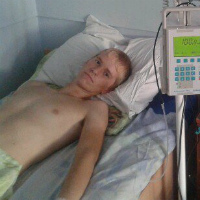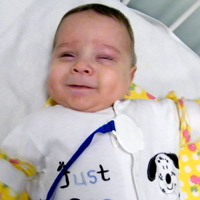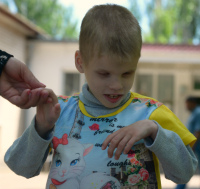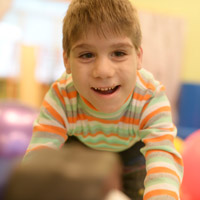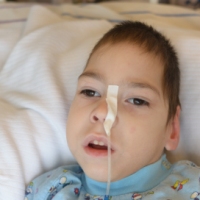|
Kranke Kinder brauchen Hilfe!
|
Published: 2008-03-21 00-05-00 Viewed, times: 15048
A month has passed since our website published УItТs Not Possible to Keep SilentФ
Honestly speaking, when I filed that article on www.deti.zp.ua and www.donor.org.ua, I couldnТt even imagine the overwhelming response it would receive. Orphaned and abandoned childrenТs problems and conditions normally inspire little interest even in journalists, let alone government officials. This time, however, it was different. Thanks to volunteers in Kiev, this article was posted on the high-traffic website www.obozrevatel.com. Camera crews from Ukrainian television stations (ICTV, Tonis) and other mass media journalists began visiting Kalinovka one after the other. Politicians, the Ukrainian PresidentТs office, and the AP all called (You can view the ICTV report on Kalinovka here (12 megabyte).
Unfortunately, the information in the news reports varied wildly. Journalists frequently reported that the children had nothing to eat and that they were dying of hunger. This isnТt true Ц there isnТt a problem with feeding the children but with providing adequate medical care. As a result, sick children are often not provided with a proper diet. Without a proper diet the children get even weaker and suffer further consequences. Other journalists, too lazy to fully acquaint themselves with the situation, wrote that the children were receiving full and adequate care.
Soon the government organs also reacted to the situation and for two weeks, commissions from the Ministry of Labor and Social Protection, the Family and Youth Ministry, representatives of the Human Rights Commissioner, Nina Karpachova, prosecutors, the KRU (Control and Revision Office [auditors], and others visited Kalinovka. The author of this article met with the deputy of the governor of the Zaporozhskoi oblast (Nikolai Frolov), who listened and carefully wrote down our view of the situation in Kalinovka and ideas for solving the problems there.
On the evening of February 29th Valery Cherkaska, Acting Governor of Zaporozhye Oblast; the head of Zaporozhye OblastТs Labor and social Protection agency(Pankratov); ZaporozhyeТs chief pediatrician; the deputy of ZaporozhyeТs main childrenТs hospital; the chief of the oblastТs public health administration; the head doctor of the regional Chernigov hospital, and the representative of the Chernigovsk RegionТs local government all came to visit Kalinovka.
It must be noted that prior to the arrival of the top oblast officials, the atmosphere amongst KalinovkaТs staff was considerably strained. The director and many of the staff were tired of the constant inquiries into the childrenТs home. Furthermore, there was a rumor spreading that the childrenТs home was to be closed, the staff fired and the children moved closer to Zaporozhye. Based on the evidence, these rumors were unfounded.
Thus, on February 29, 2008, the volunteers had a rare opportunity to relate the problems at the Kalinovka ChildrenТs Home directly to the governor, which we took advantage of. In short, our position consists of the following:
1. We consider the most pressing issue at Kalinovka to be the lack of qualified medical care for the children. We appeal to the oblast administration with the request that measures be undertaken as soon as possible to improve the medical care shown the children. The final goal will be to reach the European standard of care for these children.
(A first possibility: partner Kalinovka either with the Tokmak or with Berdyansk regional hospitals and guarantee thrice-weekly visits to the childrenТs home from a group of qualified doctors, lab specialists and nurses. A second possibility Ц find a permanent doctor for the childrenТs home, guarantee a quality wage (not UAH 900 [$180], but UAH 2500-3000 [$500-600]), and periodically invite qualified specialists for planned check-ups. The children require constant check-ups with neurologists, psychiatrists, dentists, and optometrists. Happy Child is ready to help underwrite the purchase of medicines, special nourishment, medical equipment, pay for cell-phone coverage, and improve the working conditions for doctors serving in Kalinovka.
2. The second most important problem: the lack of rehabilitation initiatives, the lack of caretakers with pedagogical training, and the large groups of children (28 or more). We believe it is imperative that the larger groups of children be divided into two or more groups. The volunteers at www.deti.zp.ua are already paying the salaries of two additional teachers.
3. We consider it inexcusable that many of the children afflicted with disabilities that limit their mobility spend years cooped up inside. According to all medical recommendations, any child who does not have a medical reason for staying inside should be outside at least once a day. Our fund is prepared to assist in purchasing wheelchairs to help facilitate this.
4. It is essential that the Kalinovka staff receive continuing education in their field by sharing experiences with other similar institutions, located in the Ukraine and abroad. There should also be seminars for the staff detailing how to work with children suffering from severe developmental disabilities.
5. It is necessary to take measures to improve the cemetery in Kalinovka Ц at the least, place gravestones or labeled steel crosses with information about the child.
6. We are completely committed to working with the internatТs current administration, headed by Nikolai Viktorovich Slavov, and through our combined efforts to improve the lives of the children. We are distressed over the attempts of the different commissions sent to Kalinovka to hold the current director responsible for all of the problems at Kalinovka. (Incidentally, he has only worked at the facility for a little more than a year and during his time at Kalinovka there has been progress in the right direction.)
We were very satisfied with the governorТs reaction to all of the points listed above. In our presence, Valery Cherkaska demanded that the oblast health administration undertake serious efforts to improve medical care and to search for a doctor. He required the Zaporozhye Oblast ChildrenТs Clinical Hospital to give regular attention to the children in Kalinovka: every two weeks a group of doctors from the hospital will come to Kalinovka, examine them and hospitalize them if necessary without delay. Valery Cherkaska also entrusted the head administrator of the Chernigov Region with the responsibility of refurbishing the cemetery. The oblastТs council gave UAH 200,000 ($40,000) for the repair of the quarters for bedridden children. Valery Cherkaska wished director Nikolai Viktorovich success in his difficult task and promised whatever help would be necessary.
Unfortunately, the response of the rest of the officials was entirely unsatisfactory. The head of the oblastТs health department, Natalya Motovitsa, always moved the conversation in another direction. In her opinion, to begin with, every effort should be made to reduce the number of children that are born with congenital disabilities. (I kept silent, but what does one do with those children who have had the bad luck of being born like that?) Then she announced that the children are actually quite well-taken care of and provided with everything and have died only as a result of the severity of their original diseases. Natalya Motovitsa constantly hinted that I, Albert Pavlov, the author of the notorious article, didnТt have proper medical training, and furthermore, how dare he shame such an exemplary institution in front of the entire country? (In my opinion, you donТt need to be that smart to acknowledge that the absence of a doctor for 150 very disabled and sick children is nonsense in any civilized state. In addition, during one of our trips to Kalinovka, we were accompanied by a qualified doctor Ц a professor at a medical school. So to criticize us for lacking medical understanding is irrational. Besides, it is hardly worth it to criticize us; it would be enough simply to hospitalize several children and fully examine them to determine which of us is right.)
In regard to the information that bedridden children УdonТt go outside for years,Ф the head of the oblast health administration considers this policy to be justified. Indeed, the children are already accustomed to staying in their rooms for days, so a change in routine would harm them. (Natalya Motovitsa did not explain how she would look Lyosha, Anton, Larissa, Katya and several other dozen children in the eye; children who themselves are asking to be let outside. But according to antiquated standards such luxuries are not permitted them).
Yet another statement from the lips of the chief of the oblast health administration: УWhat, you take an imbecileТs smile to reflect real emotions?Ф In my estimation, that statement perfectly captures the soviet attitude toward treating invalid children, an attitude that persists in our culture today, particularly when dealing with neurologically and physically handicapped children. They are treated like outcasts and a burden to society.
Summary
In summarizing the response to the situation in Kalinovka I highlight the following:
Negative Consequences:
1. Excessive antagonism from the Labor and Social Protection officials and health officials towards volunteers. It is possible (but unlikely) that volunteers will find it more difficult to access similar institutions in the future.
2. A nerve-wracking couple of weeks for Nikolai Viktorovich, director of the childrenТs home (inspections from the SBU (Ukrainian successor to the KGB), prosecutorТs office, and KRU).
3. Wasted time for the director and volunteers spent talking with journalists.
Positive Consequences (in my opinion, there were more positives than negatives):
1. Tens of thousands of Ukrainians (and even foreigners) heard about the problems in such childrenТs homes. Many have already begun helping Kalinovka or searching for similar institutions in their own oblasts.
2. Information about the state of affairs in such facilities has reached the highest officials, not only in the oblasts, but even in the national government. Without publication, it is difficult to imagine a visit from the top oblast officials to Kalinovka at 6 pm on February 29th.
3. A doctor is already working in Kalinovka Ц a woman, formerly employed as the head doctor in the district hospital of the village Novospasskoe. (As it turns out, when you really need to, you can find a doctor!). As before, the doctor from Chernigov Regional Hospital is employed part-time at Kalinovka. Once every two weeks the childrenТs home is also to be visited by a group of doctors from the Oblast ChildrenТs Hospital.
4. The childrenТs home has received eighteen new employees, of them, ten are caretakers for the bedridden children, one is a teacher, and one a director of social activities.
5. From now on oblast officials will need to give the problems at Kalinovka far more attention.
6. Thanks to the publication of the aforementioned article, the childrenТs home has gained new sponsors and volunteers Ц churches, organizations, and private individuals.
7. An additional UAH 200,000 (about $40,000) has been allocated from the government budget for a major renovation of the quarters for bedridden children. The renovation is planned to begin in May and finish in September; for the completion of this goal there have been allocated a total of UAH 700,000 ($140,000).
8. There is hope that the cemetery will be properly improved in the near future.
9. One child from Kalinovka, Sasha, has been hospitalized in the Zaporozhye Oblast ChildrenТs Clinical Hospital (ZOCCH). Sasha is fourteen years old and weighs eleven kilograms. During his admission it was suspected that there was a swelling of the abdominal cavity (dense, swollen abdomen the size of a soccer ball). Over the course of several days the doctors cleansed the bowels with enemas. As it turns out, over a long period of time the stomach did not empty and filled with potassium deposits. At present the abdomen has halved in size, but cirrhosis of the liver is now suspected and surgery may be necessary. The surgeon at ZOCCH is convinced that Sasha was deprived of medical care. With medical care such an outcome would have been impossible.

Sasha in the surgical ward of ZOCCH
Volunteers of the website www.deti.zp.ua and colleagues at the Zaporozhye charitable fund УHappy ChildФ thank all the kind-hearted people who responded (journalists, civil servants, citizens) to the call for help. We are ready to partner with all those prepared to change the lives of these children for the better.
Current Needs
At present we would like to highlight the following needs of the childrenТs home in Kalinovka:
1. A well-trained physical therapist and masseur.
2. Volunteers to take walks and engage with the children.
3. Purchase of Nestle Peptamen, special nutrition for feeding children with hypotrophy/malnutrition.
4. Hardcover childrenТs books (Chukovski, etc.).
5. Colored pencils, sketchbooks, and paper.
6. Construction of a sports-exercise area.
7. Furniture for the game room (round childrenТs tables, napkins, game cabinets, leather-cushioned corners).
8. Beds on wheels.
9. Two water-heaters (80 liters).
10. Educational toys; big, durable toy cars, dolls.
11. Quality wheelchairs.
12. Carpeting.
13. Quartz lamps, similar to Aero-life lamps.
14. Sports balls and other sports equipment.
15. Pampers.
16. New spring-summer childrenТs clothing and shoes.
We welcome any and all donations, no matter how small or large. We regularly publish on our site our income and expenditures. If you wish to make a contribution, there are several options:
1. Direct donation using PayPal, Western Union, MoneyGram, and other methods. See How to Contribute
2. If you wish to make a tax-deductible donation to Happy Child from within the U.S., you may do this through Mr. James Shetler of EleanoreТs Kids in Minneapolis. EleanoreТs Kids is a registered 501c3 charity whose purpose is to help children in Zaporozhye Oblast. Jim accepts donations for Happy Child, issues a tax-deductible receipt, and forwards donations via MoneyGram to Happy Child in Zaporozhye. Contact Jim at astugen@prodigy.net or David Sudermann at dsudermann@charter.net for further information.
Sincerely,
Albert Pavlov
+3 8 066 513 34 35 +3 8 061 701-32-86
www.deti.zp.ua detizp@mail.ru
P.S. On March 11, Andryusha (the boy with terminal malnutrition and the center of the incident which led to the firestorm of publicity) died. In February Andryusha stayed for a week in the Chernigov Regional Hospital, gained some weight, and was then transferred back to Kalinovka. Unfortunately, even at the hospital, they were unable to discover the cause of his vomiting. I trust that the Lord received this little martyr into heaven and that the soul of Andryusha found peace.

Andryusha...
Diese Veroffentlichung ist mit folgenden Kategorien verbunden:
Die Ukraine Veroffentlichungen mit Bildern Kalinovka Waisenhaus (Bezirk Chernigiv) Orphans
Die Ukraine Veroffentlichungen mit Bildern Kalinovka Waisenhaus (Bezirk Chernigiv) Orphans
|
Aktuelle Projekte:
|
Unsere Berichte:
|
Ukrainische Waisen suchen eine Familie:
|



